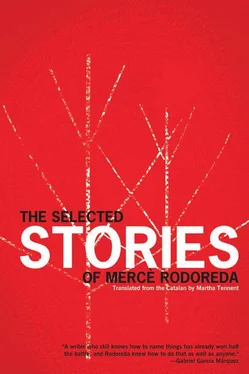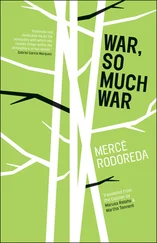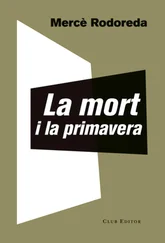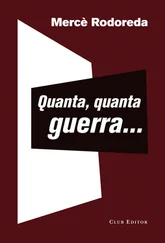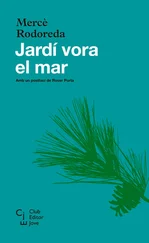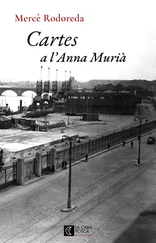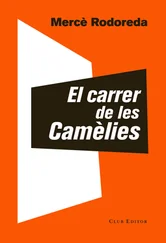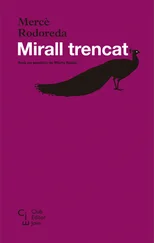That night, when I sat down, I suddenly realized I had nothing left to hope for: my life faced the past, with him inside me like a root inside the earth. The following day, they scribbled the word “witch” on my door with a piece of coal; and that night, outside my window, in a loud voice so I would hear, two men said that I should have been burned at the stake when I was little, together with my mother, who used to escape into the sky with vulture wings while everyone was asleep. I should have been burned before they needed me to dig up garlic, bind the wheat and alfalfa, and pick grapes from wretched vineyards.
I thought I saw him one evening at the entrance to the root forest, but he ran away when I approached; I couldn’t be sure whether it was him or my desire for him or his shadow searching for me in the trees, lost like me, moving back and forth. “Witch” they cried and left me with my misfortune, which was not the one they would have wished for me. I thought about the pond, the watercress, the thin branches of the willow tree. Winter was dark and flat, leafless: there was only ice, frost, and the gelid moon. I couldn’t leave the house, because to walk in winter was to walk in sight of everyone, and I didn’t want to be seen. When spring arrived, its leaves tiny and joyful, they built the fire in the center of the square and gathered dry, well-cut wood.
Four of the oldest men in the village came for me. I called to them from inside, saying I wouldn’t accompany them, but then some young men with large, red hands appeared and smashed the door with an axe. I screamed because they were taking me from my house, and when I bit one of them, he struck me on the crown of my head. They picked me up by the arms and legs and threw me on top of the pile of wood, as if I were just another branch; they tied my hands and feet and left me there, my skirt up. I turned my head. The square was crowded: the young people were standing in front of the elderly, the children in their new Sunday smocks in a corner, holding olive branches in their hands. As I gazed at the children, I noticed him: he was standing beside his wife with the blonde braid. She was dressed in black, and he had his arm around her shoulder. I turned back and closed my eyes. When I opened them again, two old men were approaching with bright torches, and the children began to sing the song about the witch who was burned at the stake. It was a very long song, and when they finished, the old men announced that they couldn’t light the fire, I wouldn’t let them. Then the priest walked over to the children with a basin filled with holy water and had them moisten the olive branches and throw them over me. Soon I was covered with olive branches, all with tender leaves. An old, hunchbacked woman, small and toothless, started laughing and left. A moment later, she returned with two baskets full of dry heather and told the old men to scatter them on four sides of the bonfire. She helped, and after that the fire took. Four columns of smoke rose, and as the flames began to climb, it seemed to me that everyone heaved a sigh of relief and peace, a sigh that came from deep down in their chests. As the flames mounted, following the smoke, I watched from behind a torrent of red water; and behind the water, every man, every woman, every child was like a shadow, happy because I was burning.
The bottom of my skirt turned black, and I could feel the fire on the small of my back. Every now and then, a flame bit me on the knee. It seemed to me that the ropes that bound me had burnt away. Then something happened that made me clench my teeth: my arms and legs started to become shorter, like the tentacles on the snail I once nudged with my finger; and below my head, where the neck joined the shoulders, I felt something stretching and poking me. The fire screeched and the resin boiled. I saw some of the people who were observing me raise their hands; others were running and stumbling into those that hadn’t budged. One side of the bonfire collapsed, sending embers flying. When the logs caught fire again, I thought I heard someone say: She’s a salamander. And I began to move across the coals, very slowly, because my tail was heavy.
My face was level with the ground as I scurried on my hands and feet. I headed toward the willow tree, following along the wall; but when I reached the end of it, I turned and from a distance I could see my house burning like a torch. No one was on the street. I made my way to the stone bench, then to the house and through the flames and embers, hurrying toward the willow and watercress. When I was outside again, I turned back because I wanted to see the roof burning. While I was watching, the first drop fell, one of those large, warm drops from which toads are born. Instantly more drops fell, slowly at first, then fast, and soon all the water from above fell, and the fire was gradually doused, spouting huge columns of smoke. I stood still, and when I could no longer see anything, because thick, black night had fallen, I started crossing puddles and mud. My hands enjoyed plunging into the spongy sludge, but my back feet kept getting stuck in the mud and were tired. I would have liked to run, but I couldn’t. A thunderclap stopped me short in the middle of the path; then came a bolt of lightning, and between the stones I spotted the willow tree. I was panting as I approached the pond. Once I was beyond the mud, which is formed by dirt on land, I found the marsh, which is dirt deposited in water. I moved into a corner of it and stayed there, half suspended between two roots. Then the three little eels appeared.
In the morning — I’m not sure if it was the following day or another — I slowly emerged and glimpsed the high mountains beneath a cloud-dappled sky. I scurried through the watercress and stopped at the willow trunk. The first leaves were still inside the sprouts, but the sprouts were beginning to turn green. I didn’t know which direction to take; if I wasn’t paying attention, the blades of grass poked me in the eyes. I slept among the blades of grass until the sun was high. When I woke up, I caught a little mosquito, then hunted for worms in the grass. After a while I returned to the marsh; I pretended I was sleeping, because the three playful eels promptly reappeared.
There was a big moon the night I decided to return to the village. The air was filled with scent, and the leaves on all the branches trembled. I took the stone path, being very careful because even the smallest thing frightened me. I rested when I reached the front of the house: I found nothing but rubble, stinging nettles, and spiders spinning and spinning webs. I crawled around to the back and stopped in front of his garden. The sunflowers were growing beside the rose-scented geraniums, their round flowers on the verge of bending. I proceeded along the blackberry hedge, never questioning why I was doing it. It was as if someone were telling me: Do this, do that. I squeezed under the door and entered. The ashes in the fireplace were still warm. I stretched out there for a while, then scampered around a bit before crawling under the bed. Dead tired, I fell asleep and didn’t realize when day dawned.
When I awoke, it was night again and I glimpsed shadows on the floor; his wife was moving back and forth with a lit candle. I could see her feet and part of her legs in white stockings, slender at the bottom, swollen toward the top. Then I saw his big feet, the blue socks falling over his ankles. I saw both of their clothes fall to the floor, and I heard them sit on the bed, their feet dangling, his beside hers. One of his feet moved up and a sock dropped, and she pulled off her stockings with both hands. Then I heard the sound of sheets being pulled over them, and they spoke in low voices. Much later, when I was accustomed to the dark, the moon entered through the window, a window with four panes separated by two crossed laths. I crawled over to the light, directly beneath the cross. I began to pray for myself, because inside me, even though I wasn’t dead, no part of me was wholly alive. I prayed frantically because I didn’t know if I was still a person or only an animal or half-person, half-animal. I also prayed to know where I was, because there were moments when I seemed to be under water, and when I was underwater I seemed to be above, on land, and I could never know where I really was. When the moon disappeared, they woke up, and I went back to my hiding place under the bed, and with tiny bits of fluff I began to make myself a little nest. I spent many nights between the fluff and the cross. Sometimes I would leave and go down to the willow tree. When I was under the bed, I listened. It was all the same. You alone, he would say. One night when the sheet touched the floor, I climbed up the sheet, hanging on to the folds, and slid into the bed, near one of his legs. I lay as still as a corpse. He turned over, and his leg weighed me down. I couldn’t move. I had trouble breathing because he was smothering me. I rubbed my cheek against his leg, being very careful not to wake him.
Читать дальше
